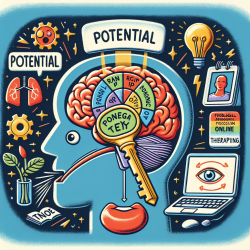Introduction
As a practitioner working with children and adolescents, understanding the intricate relationship between disruptive behavior disorders (DBDs), depression, and marijuana use is crucial for effective intervention. The study "Disruptive Behavior Disorders and Marijuana Use: The Role of Depressive Symptoms" provides valuable insights into these interconnected issues, highlighting the mediating role of depressive symptoms.
Key Findings
The research conducted by Morse, Benson, and Flory (2016) examined the relationships among attention-deficit/hyperactivity disorder (ADHD), conduct disorder (CD), oppositional defiant disorder (ODD), depressive symptoms, and marijuana use among college students. The study found that depressive symptoms significantly mediate the relationship between DBDs and marijuana use.
- Depressive symptoms mediated the relationship between past ADHD symptoms and marijuana use.
- Depressive symptoms fully mediated the relationship between CD symptoms and marijuana use.
- Depressive symptoms mediated the relationship between ODD diagnosis and marijuana use.
Implications for Practitioners
For practitioners, these findings underscore the importance of comprehensive assessments that include screening for depressive symptoms in clients presenting with DBDs. By identifying and addressing depressive symptoms, practitioners can potentially reduce the likelihood of marijuana use as a coping mechanism.
Consider implementing the following strategies in your practice:
- Conduct thorough assessments that include screening for depressive symptoms in clients with DBDs.
- Monitor marijuana use and explore its potential role as a coping mechanism for depressive symptoms.
- Incorporate interventions that address both DBDs and co-occurring depressive symptoms.
- Educate clients and their families about the potential risks of marijuana use, especially in the presence of depressive symptoms.
Encouraging Further Research
While this study provides valuable insights, further research is needed to explore the causal pathways and long-term outcomes associated with DBDs, depression, and marijuana use. Practitioners are encouraged to stay informed about emerging research and integrate evidence-based practices into their work.
To read the original research paper, please follow this link: Disruptive Behavior Disorders and Marijuana Use: The Role of Depressive Symptoms.










